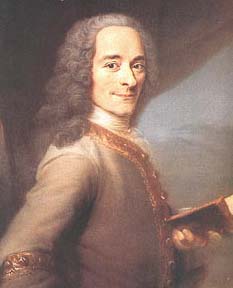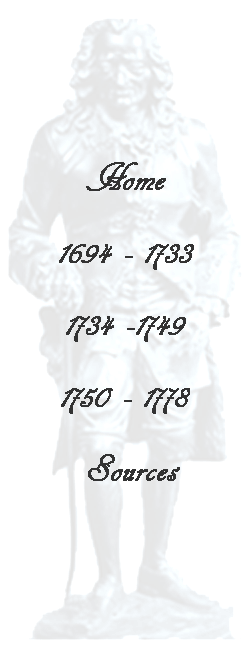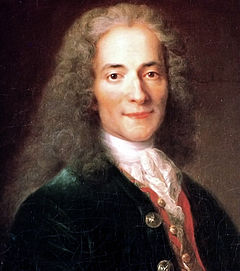by Catherine Lusurier
after Nicolas de Largillière's painting


 |
B
orn François-Marie Arouet on November 21, 1694 in Paris, he was the youngest of the three surviving children of François Arouet and Marie Marguerite Daumand. Voltaire's mother died when he was seven years old and he and he was raised by his sister Marguerite-Catherine. He was also mentored by his godfather, the abbé de Châteauneuf, a friend of his mother's. The abbé encouraged Voltaire to reject the superstition which was rife at the time and encouraged his study of deism and literature.Voltaire was enrolled at the prestigious Jesuit school, Collège Louis-le-Grand from 1704 to 1711. He received a classical education, with a heavy emphasis on Latin. After completing his schooling, Voltaire wanted to start a career in writing, but his father opposed it, preferring instead that he become a notary. Said the elder M. Arouet:
"Literature is the profession of the man who wishes to be useless to society, and a burden to his relatives, and to die of hunger."
Voltaire was sent to the Hague, as a secretary to the French ambassador, and there he fell in love with a beautiful French refugee named Catherine Olympe Dunoyer. Their planned elopement was foiled by Voltaire's father and he was forced to return to France, where he worked as an assistant to a prosecutor in Châtelet. At this time, against his father's streneous opposition, he began to socialize with literary types in the Temple where his wit and congeniality established him as a popular figure in Regency literary circles.
.jpg) |
I
n 1717, he was accused of writing two anonymous libels, the Puero Regnante and J'ai vu, and spent eleven months in the Bastille, being released only after the real author came forward. This event was a watershed in Voltaire's life. The injustice of his false imprisonment left an indelible impression on Voltaire, and from that day onward he became an advocate for judicial reform. After his time in the Bastille he changed his name to Voltaire, writing:"I was very unlucky under my first name. I want to see if this one will succeed any better."
The most-commonly accepted explanation for the pseudonom is that Voltaire is an anagram of the letters "AROVET LI ", which is a Latinized, shortened form of Arouet le jeune [Arouet the young]. In addition to changing his name, the other significant event that occured during his time at the Bastille was that he completed his first play, Œdipe, which was performed at the Comédie-Française after his release. It was an immediate triumph, and its critical and popular acclaim established his literary reputation.
I
n late 1725, Voltaire was involved in an argument with a nobleman, the Chevalier de Rohan. As a result, he was first sent again to the Bastille based on a secret warrant called a lettre de cachet, and was given the option of remaining in prison or choosing to serve out his sentence in exile. He chose the latter and spent nearly three years in England, and his experiences there greatly influenced many of his ideas. Having become fluent in English in a mere six months, he quickly assimilated into English high-society, gathering such friends as: |
I
n 1729 he returned to Paris and publicised his views on British attitudes towards government, literature, and religion in a collection of essays in letter form entitled the Lettres philosophiques sur les Anglais [Philosophical Letters on the English] (1733). This publication, with its praise for the constitutional monarchy of England as a more progressive form of government than the absolute royalty of France and its support for Newton's physics and Locke's philosophical principles created tremendous controversory and trouble for Voltaire in France. The situation culminated with an arrest warrant being issued for Voltaire in 1734, forcing him to flee Paris again.He was offered refuge by Gabrielle Émilie, marquise du Châtelet, at her husband's estate, the Château de Cirey at Cirey-sur-Blaise in eastern France. The time he spent with Émilie was one of the most significant and productive periods in his life.
Deirdre Moore  195B Rue du Velard
195B Rue du Velard  Thoiry, 01710
Thoiry, 01710
Contact the webmaster at:
deirdremarymoore@hotmail.com